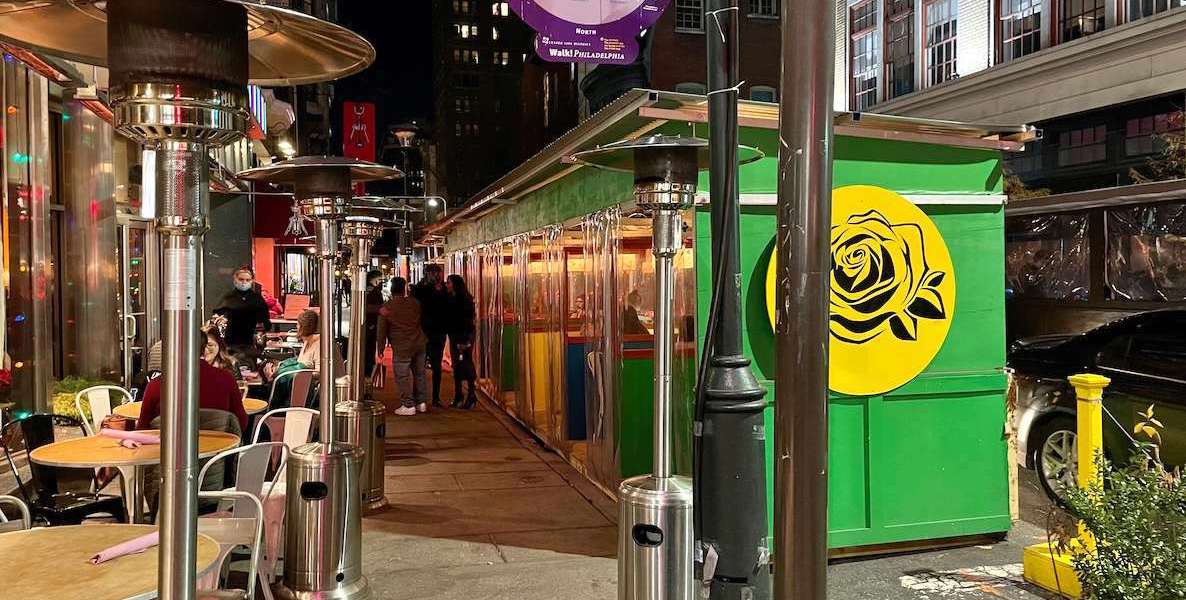Last week, amid a slew of Omicron-caused staffing shortages, temporary closures and reservation cancellations, restaurateurs in Midtown Village received a letter from the Philadelphia Streets Department with news that, to some, seemed unfathomable:
“Utility work that requires full access to the right-of-way adjacent to your business shall begin on January 10, 2022,” the letter read. “Before that date, kindly remove your installations to facilitate that work.”
“Installations” refers to the streateries that have helped many restaurants weather the continuously changing pandemic circumstances—including helping them maintain a semblance of business over the last couple of weeks.
The letter went to every restaurant on 13th Street between Locust and Chestnut that have structures in the street. They were asked to dismantle their outdoor set-ups to accommodate the Streets Department’s work on street lighting repairs, which requires trenching the pavement to access the conduit that runs under the street on which the structures sit.
“Why do this and take the structures down in a time where what we need to do is make sure that the businesses in the city stay open?,”asks Nicole Marquis.
That the work needs to be done is clear to everyone. And restaurant owners knew from the get-go that public-good issues—like snow removal and utility work—would have the right-of-way over their dining structures. Also, as Mayor Kenney’s Deputy Communications Director Kevin Lessard pointed out, street closure permits expired at the end of 2021 and new regulations passed by City Council that will take effect in March prohibit streateries occupying travel lanes—as those on the east side of 13th Street do.
Still, many are baffled by the City’s nonchalant approach. Most received the letter, dated in mid-December, around New Years. Because restaurateurs complained about the short notice, the Streets Department extended the clear-by date to January 20th—30 days from the post-mark date. No one—not the Streets Department, or anyone else in City Hall—has offered help in dismantling the set-ups. (Nor to work with businesses to find a more ideal time to complete the work.)
“There has to be some better plan than just, Everyone move your streatery,” says Val Safran of Safran Turney Hospitality, which runs, among other restaurants, Barbuzzo and Lolita on 13th Street. The outdoor structure they built for the two restaurants cost about $65,000, she says—and it would cost thousands more to take down and then rebuild. “You don’t just move it and put it back—it’s not that simple.”
Safran Turney had to close their restaurants sporadically for days at a time leading up to New Year’s Eve—one of the busiest weeks of the year—because of Covid-caused staffing shortages. All told, Safran estimates they lost at least $250,000. And now, with the cost of supplies still cripplingly high, they’re entering what’s often the slowest month in the restaurant industry.
Under normal circumstances, January might have been an ideal time to have to remove their streatery, when there are fewer reservations anyway. “But now we’re back into a heavy pandemic and we have a lot of reservations that specifically requested outside,” says Safran. “For some people, that’s the only place they’re gonna sit right now.”
There’s more at stake here than whether we get to enjoy a hot toddy in a festively lit chalet in the Gayborhood. Restaurants employ more than 40,000 Philadelphians—some of whom are among the most economically vulnerable in the city. Nationally, restaurants are the number one employer of single women, citizens returning from incarceration, first-time workers and immigrants. And most restaurants in the city are small businesses with already small margins—the kind that have really struggled to stay afloat for the past two years.
City Council acknowledged the benefit of streateries late last year with legislation that allowed many restaurants to maintain their outside seating indefinitely. (Though that allowance varies by Council district.) This, though, makes it seem like city agencies are working at cross-purposes to make it harder, not easier, for restaurants to succeed.
When asked if the work could be delayed, Deputy Commissioner of Transportation Richard Montanez said they had already postponed the work for nearly two years due to the pandemic, adding that, “We budgeted the money for this year and we’re planning to pave the street in 2023. So I’d rather do the work now and that way when I pave the street, I don’t have any cuts.” As long as they don’t have issues procuring materials—a question with everything these days—he estimates the work will take about four weeks.
“There has to be some better plan than just, Everyone move your streatery,” says Val Safran
Nicole Marquis of Marquis & Co. restaurant group, which includes Charlie was a sinner at 13th and Sansom streets, hired a contractor to dismantle their streatery—which cost more than $40,000 to build—Friday morning. It will cost her business about $10,000 to have it removed.
“It was a lifesaver for us—and our guests loved it,” she says. “But it will be too expensive to build it back.”
The particular restaurants affected by the planned utility work are Charlie Was a Sinner, Double Knot, Sampan, El Vez, Barbuzzo and Lolita . They are in the heart of the city—a key part of what makes it feel alive and open for business.
As Marquis wonders: “Why do this and take the structures down in a time where what we need to do is make sure that the businesses in the city stay open?”
![]()
MORE PHILLY RESTAURANT COVERAGE FROM THE CITIZEN
Header photo by Josh Middleton




